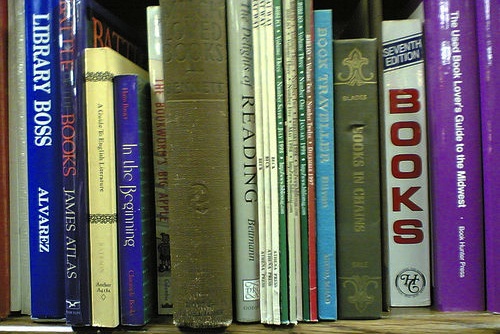
Note, if you are interested in how people search for and choose books, please take my short 2 minute, 4 question survey here: http://www.surveymonkey.com/s/5S2P2FV
Now, I want to look at the 3 biggest ways that Amazon's dominance of the online book retail market influences the way we search for, find, and choose books. Note that I like Amazon and this is not a hate article on Amazon. What it is is a deep dive on how their structures and conventions influence how we find books.
Spoiler alert: My conclusion is that we skim books by cover design in groups arranged by arbitrary genre labels and suggests further reading based on sales.
Here's how I got to that conclusion:
It wasn't long ago that people had to ask friends, librarians, and bookstore owners for recommendations on what book to read next. In the early '90s, there wasn't much to go on outside of television, newspapers, and magazines. If you wanted recommendations that weren't based on mainstream media or bestseller list, you had to seek out specific people who knew that genre. But the Internet has changed all that.
And, specifically, Amazon has changed that for books. Because they make up the bulk of the online sales market, readers and authors alike focus on Amazon as THE online book marketplace. As a result, the way we search for books is skewed toward the way Amazon presents them and allows us to search for them.

Here are the 3 biggest ways Amazon's dominance is influencing how we search for books:
1. Bought vs. Liked: Amazon recommends books at the bottom of each webpage in their store.
They have 3 questions they use as headers to suggest books to you as you shop (Underlines mine):
-
Frequently Bought Together
-
Customers Who Bought This Item Also Bought
-
What Other Items Do Customers Buy After Viewing This Item?
Notice how all 3 are about what people BOUGHT/BUY. This is not irrelevant, but it says nothing at all about what people think of the book you're looking at, what other authors or books are similar, or anything related to you, the reader and shopper, at all. It's just telling you what other people purchased. For me, that's not much of an indicator about what book I want next.
If you're like me, you buy a whole lot more books than you would recommend or give to a friend. And many of the purchases are for different reasons, from work and research to gifts for friends. Sometimes I buy things for a few different reasons at the same time. Is it relevant as a recommendation to a shopper that I bought a Richard Brautigan book during the same session as I bought a cookbook? Not really.
2. Genres: Amazon arranges books by browse categories and genre. That means when we look for them, the virtual bookshelf is a whole bunch of books that are really similar, right? Not really. It just means that they have the same genre or sub-genre designation. Those browse categories and designations are chosen by the people who submit the book, not by a curator like a bookstore owner or a librarian. That means there is really very little rhyme or reason around what books are lumped together. It's just what publishers, authors, and interns who submit books think. That means there are millions of people categorizing books with millions of different definitions of what those category names mean and what they expect to find there. And none of those definitions and expectations are based on the shopper. So, there's a bit of a mismatch...
3. Covers: When we used to look for books in stores and libraries, they were arranged spine out. Now, we look at the cover. That means we are using a small, digital icon as the most stand-out thing about the books we are browsing. Humans are visual people, so we have colors and images we respond to more and less. Good cover designers know this and use it to make good covers. Does this mean we are buying books just because of the cover? Nah. But it probably does mean we are drawn to read descriptions of books that have really good cover designs, and probably that we skip over a few books that are well-written but maybe don't have a great cover design. Is this bad? Tough to say. It's just new.
So, overall, I think Amazon influences us to skim books by cover design in groups arranged by arbitrary genre labels and suggests further reading based on sales. It's a place start, but I think we all can do better figuring out how to help readers find that next perfect book.
What do you think?
Image source: PaulSteinJC and jm3 via flickr

0 comments